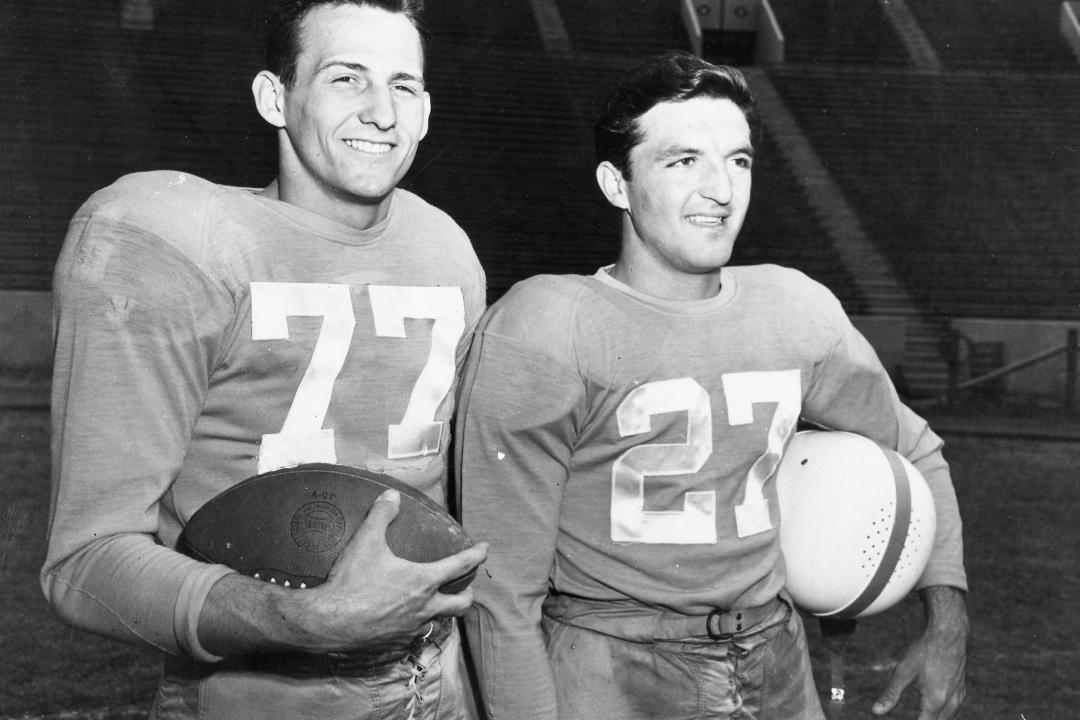The list of Tennessee sports legends keeps dwindling.
Harold “Herky” Payne, the greatest second-team tailback in Volunteer history, died of natural causes in the early morning hours of Tuesday at a Deane Hill nursing home. He was 92. Obit here.

Herky Payne
Seventy years ago, Payne led the Southeastern Conference with 14 touchdowns as the Volunteers won the national championship. He returned a punt 90 yards against Duke in 1949. He was second baseman on a UT baseball team that made it to the finals of the College World Series.
“Great guy, great friend, great teammate,” said Jim Haslam, Tennessee tackle at the time.
“Everybody liked Herky Payne and he liked everybody,” said Jim Smelcher, another old Vol and very close friend.
“He was the kind of man who would go the extra mile. I always thought he gave more than he got.”
Payne and Smelcher were long-time members of the Long’s Drug Store breakfast club. Many tall tales were traded over bacon and eggs.
Haslam was in the 1950 lineup when General Robert R. Neyland chose Hank Lauricella as the No. 1 tailback and pointed him toward an all-America career and the College Hall of Fame.
Haslam was there when the going got tough closer to the goal and the coach sent in Payne for crucial yardage and points.
“Hank and Herky were a perfect combination,” said Haslam. “Herky never showed even a hint of jealousy.”
Long ago, I had to ask to get Payne to put the relationship in perspective.
“I never liked being second-team, no man wants to play behind another, but Hank was an outstanding player, a genuine triple threat, an all-around good guy – and he was my friend.”
Herky grew up in Pensacola. He was a great all-around athlete in high school. In his spare time, he was light heavyweight boxing champion. In an era when recruiting was still relatively low key, college coaches came in clusters, seeking his services. Ole Miss gave great effort.
“Murray Warmath came to recruit me for Tennessee. We drove out to the beach and talked and talked. When it was time for him to go, he seemed reluctant to leave. He finally explained: ‘The General told me not to come back without you.’”
Haslam recalled a scene from the 1951 Cotton Bowl. Lauricella made his famous 75-yard run to the Texas 5. Neyland sent in Payne.
“He called a power play to the right. The Texas defensive end knocked the heck out of Herky. He went the other way on the next play and threw a touchdown pass to John Gruble. That was the first quarter. He didn’t play much the rest of the game.
“Herky summed it up perfectly a little later: ‘Threw for one, through for the day.’”
Teammates knew Payne was a great football player. Sportswriters and broadcasters were not so sure. Herky won three-team honors on the Associated Press all-SEC team.
Payne was a very good baseball player. He batted .374 for the 1951 team that went 16-1. He hit .333 in 1952.
Payne was drafted by the Pittsburgh Steelers (ninth round, ahead of Andy Kozar and Lauricella). He won a job but suffered a serious concussion in the final exhibition game.
“The Steelers were good to me,” said Payne. “They paid me while I was getting well.”
His salary was $5,500.
Herky played pro baseball, for the Jacksonville Beach Sea Birds. Barely, sort of, he said.
“They paid $280 per month. Minor league baseball was very exciting. The lights were bad, the fields were bumpy and the pitchers were wild.”
A lot of people knew or knew of Herky Payne. He was a good U.S. soldier for two years. He was recreation director for Oak Ridge National Lab for 13 years. He operated a Mickey Mantle men’s shop. He returned to the university, earned a master’s and became a teacher and coach at Farragut High.
He earned wide respect as a good citizen and community leader. He’s in the Greater Knoxville Sports Hall of Fame.
I think Smelcher was correct. Herky gave more than he got.
Marvin West welcomes reader comments or questions. His address is marvinwest75@gmail.com

